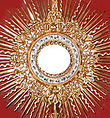|
Mirae caritatis
Mirae caritatis is an encyclical of Pope Leo XIII on the Holy Eucharist given on 28 May 1902. Its theme is mainly the marvelous effects of devotion to the Holy Eucharist in the moral and spiritual life of the faithful. The Pope explores several aspects of eucharistic theology, citing the Eucharist as the source of life, a mystery of faith, a bond of charity, and the sacrifice of the Mass.[1]
As in previous encyclicals, Leo continues his call for social renewal, which source is found in the Holy Eucharist. He maintains that the sacrament fosters mutual charity that will promote Christian brotherhood and social equality.[1] Having extolled the many benefits of the Eucharist, Leo then encourages frequent reception of same, a matter that was the subject of some debate at the time.[1]
Leo's successor, Pope Pius X, reiterated this in his 1905 motu proprio Sacra Tridentina Synodus, and the 1910 Quam singulari, which established the "age of reason" (about seven years of age) as the threshold for children to be admitted to the sacrament. The expression mirror of charity itself was popularized by Ailred of Rievaulx during the Middle Ages. Leo XIII's encyclical was cited by Popes Pius XII and Paul VI in their own teaching documents, respectively Mediator Dei and Mysterium fidei. See alsoReferences
Sources
|
||||||||||||||||||||||||||

